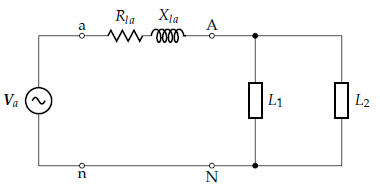Here is my equivalent balanced three phase circuit Y-Y with neutral:

Rla + jXla is my line impedance by phase. L1 and L2 are my loads. The exercise is saying that L1 absorbs 180 W and 240 VAr, L2 absorbs 600 VAr and has 0.6 lagging power factor. The line impedance is 5 + j8. The line voltage is 240 V. Its asking me what is the voltage VAN across the loads.
LOOK WHAT I HAVE TRIED:
VAN.IL1* = SL1 = 180 + j240 VA
VAN.IL2* = SL2 = 450 + j600 VA
VAN.IL* = SL = SL1 + SL2 = 630 + j840 VA
IL = IL1 + IL2
VaA = IL.(Ra+jXLa)
VAN = Van - VaA
Van = 240/sqrt(3) with angle of -30 degrees
SL/IL* = Van - IL.(Ra+jXLa)
(630 + j840)/IL* = (120 - j69.282) - IL(5 + j8)
When I throw this equation at wolfram alpha, It says there's no solution:
Link for wolfram alpha's analysis
What am I doing wrong?
